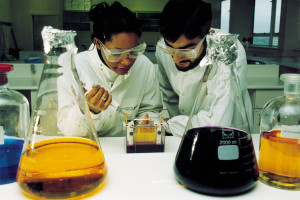Biomedical Scientist (Microbiologist) Job Duties
With a master’s degree in public health, you may choose to become a biomedical scientist, or microbiologist. These professionals work in the field of health care and works on a great many lab tests and scientific techniques involving samples of tissues and fluids to help doctors better diagnose diseases and other illnesses. These scientists also research how effective treatments are for many diseases. The work of biomedical scientists is essential for the function of many research laboratories and hospital departments. These scientists might work on serious medical problems including cancer, AIDS, malaria, anemia and diabetes. See all Public Health Careers.
Usually, a biomedical scientist, or microbiologist, will focus on a certain area of science, such as:
- Clinical chemistry: analyzing bodily fluids and toxicology reports
- Medical microbiology: identify the microorganisms that are responsible for diseases
- The science of transfusion: check compatibility of blood donations with that of patients, ensure that blood bank supplies are sufficient
- Haematology: the study of blood and diseases related to blood
- Cytology: various types of cellular analysis, include cervical smears to check for cancer
- Immunology: the study of the immune system and understanding how it fights disease
- Virology: identifying deadly diseases; monitor how effective vaccines are
A biomedical scientist will usually work with high-tech equipment with a lot of automation, as most laboratories today are mostly computerized. Some job duties that you will perform include testing blood and tissue for various enzymes and hormones; analyzing the cultures of cells that are grown from samples of tissues; communicate test results to staff, who use this information to treat sick patients; use IT to analyze and record critical data, writer reports; help to document test and lab results; work on creating new investigational methods and keep in tune with the latest diagnostic breakthroughs.
Most professionals in this field work in R&D, and they conduct research so as to increase knowledge in the field.
A master’s of public health is a good degree to have in this field as it gives you a perspective of not just a scientist, but a good perspective of how illnesses and diseases affect society.
Biomedical Scientist Career & Salary Outlook
The Bureau of Labor Statistics (BLS) reports that the employment of biomedical scientists or microbiologists is expected to grow by 13 percent from 2010-20, which is about average compared to other professions. There will be more of these scientists needed to apply knowledge from research to develop new biological drugs and other processes to improve people’s lives.
As new drugs and treatments are developed, the demand should increase for biomedical scientists and microbiologists. More of these scientists will be needed to conduct research and to create new medicines and treatments.
Job Outlook for Biomedical Scientists
Many of the projects that you will be involved as a biomedical scientist or microbiology will require the knowledge and skills of scientists from other fields, including public health, chemistry, medicine and biochemistry. If you have a broad grasp of microbiology and how it relates to these other fields, you will have the best prospects.
You should remember that much of the research that is done by biomedical scientists will be dependent upon federal government funding via the NIH and the NSF. So, the job prospects in this field will always be somewhat dependent on decisions made regarding the federal budget each year. The competition in this field for research grants is intense.
Salary Potential of Biomedical Scientists
The median annual wage for biomedical scientists or microbiologists was $65,900 in 2010, according to BLS. The top 10% in the field earned in excess of $115,000 per year.
The types of jobs in the field were broken down in the following categories:
- Federal government: $94,600
- R&D in scientific organizations: $68,000
- State government: $63,000
- Pharma and medicine: $62,300
- Colleges: $49,400
A master’s of public health will help you to earn a higher salary, as you have a well-rounded understanding of not just the science of diseases, but how they affect the community.
Biomedical Scientist Education and Training
To become a biomedical scientist or microbiologist, you will need a bachelor’s degree in microbiology, biochemistry or a related field. Most people who major in microbiology will take coursework in microbial genetics, microbial physiology, environmental microbiology and virology. You also will need to study chemistry, biochemistry and physics. You also may need to take classes in statistics, computer science and mathematics. Your master’s in public health will be a strong benefit to you in this field, as you will have the skills and tools to work with the public on how to mitigate the effects of deadly diseases. See online mph programs.
You will need to have a great deal of experience working in a laboratory before you begin working. Most programs at colleges in microbiology will include laboratory work, but you should try to get additional laboratory work when possible. It is recommended that you get involved in an internship program and get additional laboratory experience.
To do independent research and work in most universities, you will need to have a PhD in microbiology. It is common for graduate students to study subfields, including virology and bacteriology.
Many microbiology or biomedical scientists start working in a postdoctoral research post. This will often last 2-3 years, where you will work with experienced scientists as you continue to learn about your field. You should try after you have done this research, you may want to attempt to publish some of your original research.
Related:
- Masters of Public Health Salary
- Masters of Public Administration FYI
- Masters of Public Policy FYI
- Masters in Epidemiology FYI
- 100+ Public health internships Worldwide














